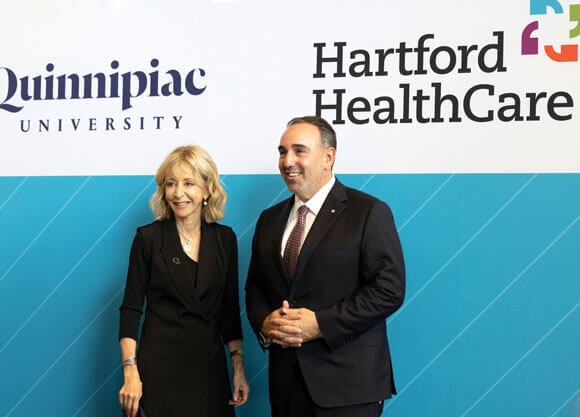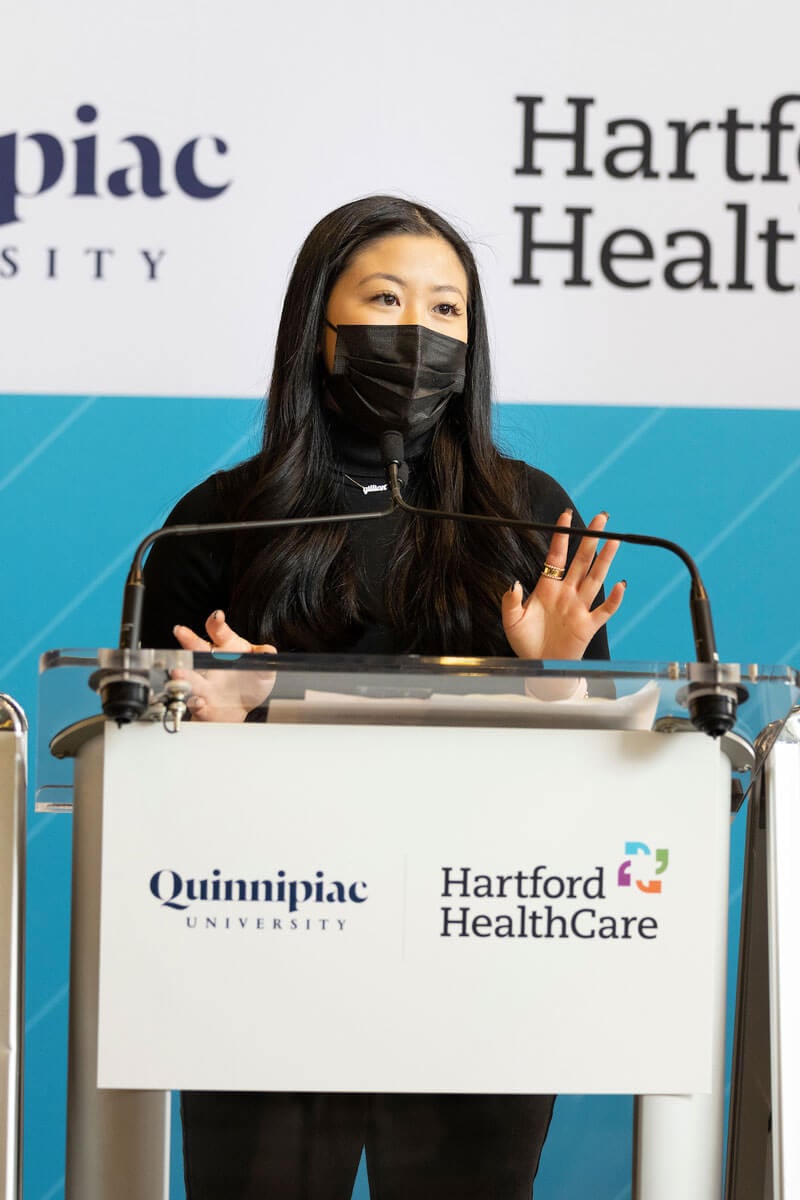
Hartford HealthCare, Quinnipiac build groundbreaking partnership
Strategic partnership to build healthcare workforce of tomorrow, grow student pipelines across industries to address long-term talent needs for state, beyond
January 19, 2022

January 19, 2022

The two organizations’ collaboration includes new lifelong learning and upskilling programs, strategies to grow talent for Connecticut’s varied skill and professional needs, and coordinated on-campus healthcare services for students, athletes, faculty and staff.
Watch the announcement on Facebook
The Governor’s Workforce Council in October 2020 reported that the demand for healthcare-related jobs in Connecticut exceeds 7,000 employees a year, with comparable skill gaps in a variety of other industries.
The Hartford HealthCare-Quinnipiac partnership will play a key role in growing and retaining talent and jobs in Connecticut by evolving academic programs that are rooted in the latest marketplace needs and addressing sectors experiencing — or anticipating — talent shortages.
“We are thrilled to partner with a leading institution like Quinnipiac University to educate and prepare the next generation of healthcare workers which will address the future needs of our state,” said Jeffrey A. Flaks, president and chief executive officer of Hartford HealthCare. “This creative partnership will make a difference for the workforce ahead as we create new training and educational vehicles for colleagues and build an essential pipeline to many rewarding careers, beyond healthcare, right here in Connecticut.”
Hartford HealthCare will make an investment in Quinnipiac and the future of the state’s healthcare workforce through a $5 million philanthropic commitment to the university over five years.
“As a university deeply committed to the physical, emotional and overall well-being of our students, this new partnership with Hartford Healthcare will enhance the on-campus health services and coordinated care we deliver,” said Quinnipiac President Judy D. Olian. “Our far-reaching collaboration will significantly enhance healthcare education both inside and outside the classroom, as well as the training and job opportunities available to Quinnipiac students all across the university.”
Flaks pointed to a recent study that concluded 1.2 million registered nurses will need to be trained by 2030. Another study, he said, predicted that there will be a shortage of 124,000 physicians by 2034.
These considerations also include making healthcare more accessible and representative, particularly to communities of color, said Don C. Sawyer III, vice president of equity, inclusion and leadership development.
"Another thing you have to think about in 2030 is the increase in communities of color, specifically when you think about the Hispanic and Latinx communities, and the need for quality healthcare," Sawyer said.
That need also includes representative healthcare.
"If you haven’t seen doctors and nurses who look like you, for some people, they may see that as something that is beyond them," Sawyer said. "When you start to see doctors who share your same religious background and your same ethnic background, you start to see a sense of hope and possibility. "
For Lynn Byers, interim dean of the School of Computing and Engineering, the partnership between Quinnipiac and Hartford HealthCare is energizing.
"I had a great conversation with one of Hartford HealthCare's simulator doctors about our mechanical engineering students developing medical devices that can be tested in their simulation center," she said.
"We also just developed some cybersecurity and healthcare badges. We’re excited about how we can partner with Hartford HealthCare on them, too. The prospect of all these different applications and opportunities is amazing."
Nursing student Gillian Chung ’22 has already experienced the transformative potential of this partnership. She's spent the past three summers improving her nursing skills in the Hartford Healthcare system.
"Quinnipiac’s School of Nursing taught me to be confident in my skills, be a leader, facilitate change with not only my patients but within the community surrounding it," Chung said.
"I’m excited to start my next chapter in the nursing profession. I believe this partnership is mutually beneficial between the Quinnipiac community and the future of Hartford HealthCare and will provide students like me with valuable, long-term experiences."
This expanded collaboration with Hartford HealthCare is one of many vibrant relationships with healthcare organizations throughout the state that continue to offer Quinnipiac students essential hands-on training and learning experiences. It builds upon Hartford HealthCare’s ongoing partnerships with other academic institutions.

Quinnipiac will contract with Hartford HealthCare’s Campus Care program to provide high-quality, coordinated health and wellness services to manage students’ complete care needs, from physical and mental well-being to athletic training for the university’s Division I athletes.
Quinnipiac’s university medical records will transition to Hartford HealthCare’s EPIC MyChartPLUS platform, making healthcare data more accessible and portable to improve and simplify the coordination of care across all providers. Current Quinnipiac staff providing clinical student health services, clinical counseling services and athletic training services will be offered employment with Hartford HealthCare Medical Group, subject to the group’s policies and procedures, but will remain in their existing roles and continue working on Quinnipiac’s campuses.
Connecticut residents and businesses will benefit from this partnership, which advances healthcare equity and access, and addresses critical workforce needs. Examples of the work Hartford HealthCare will undertake with the Schools of Medicine, Nursing and Health Sciences:
Significantly expand the breadth and number of clinical rotations for our students while they pursue their degrees, in addition to job opportunities after graduation.
Support Quinnipiac in growing the size of its nursing, health sciences and graduate medical education programs.
Partner with Quinnipiac’s Frank H. Netter MD School of Medicine on the development of graduate medical education curricula and in recruiting clinical faculty.
Hartford HealthCare will collaborate with Quinnipiac to alleviate current and future talent shortages across many professional fields by building college-to-career pipelines that offer immersive and clinical learning experiences and rotations, keep graduate talent in state, and encourage upskilling and lifelong learning for those already employed.
For example:
Quinnipiac’s School of Business will create a leadership development program to educate Hartford HealthCare’s developing leaders, from individual contributors to senior executive and physician leadership.
Hartford HealthCare will create practicums, internships, and research and capstone opportunities for undergraduate and graduate programs across Quinnipiac’s eight professional schools and the College of Arts and Sciences, which may range from fields such as supply chain management and computing, to data analytics, finance and legal compliance, communications and bio-mechanical engineering, among others.
Quinnipiac will offer professional development and upskilling opportunities to the health system’s 33,000 colleagues; all Hartford HealthCare employees and dependents will be eligible for a tuition discount at Quinnipiac.
Hartford HealthCare (HHC) and Quinnipiac University (QU) announced a unique, university-wide strategic partnership focused on building the healthcare workforce of tomorrow and growing student pipelines across a wide range of industries that will address long-term talent needs for the state and beyond. The two organizations’ collaboration centers around three core areas: redefining healthcare education, providing our university community with high-quality, coordinated health and wellness services, and developing and growing the state’s workforce. Hartford HealthCare will make an investment in QU and the future of the state’s healthcare workforce through a $5 million philanthropic commitment to the university over five years.
HHC will work with QU to develop a variety of programs and educational and workforce opportunities spanning the Schools of Medicine, Nursing and Health Sciences, including the development of a high-tech training and simulation laboratory on QU’s North Haven campus for state-of-the-art, hands-on training. Here are examples of some school-specific areas of collaboration:
Create more opportunities for students of QU’s Frank H. Netter MD School of Medicine in both undergraduate and graduate medical education, including:
Develop new sites for clinical placement of students across a variety of HHC clinical sites.
Partnership with HHC to recruit additional clinical faculty.
Expand upon HHC’s and QU’s existing residency training programs in Internal Medicine and Radiology by establishing surgical residency training at St. Vincent’s Medical Center.
Establish new residency programs in Psychiatry and Family Medicine.
Grow much-needed nursing talent through new educational offerings and job opportunities both as students are pursuing their degrees and after graduation:
Development of a Certified Nursing Assistant (CNA) program, which begins during undergraduate studies and offers employment as student nurse techs within HHC during a student’s graduate work and continues after successful completion of the program.
Clinical rotations at HHC for participants in a new Acute Care Nurse Practitioner Program that is being developed.
Expanded employment opportunities at HHC locations for graduates of various nursing programs.
Advance student research, scientific, ethical and administrative perspectives that are needed to thrive in health sciences fields, including:
New Ambulatory Surgery Center rotations for Physician Assistant students.
Increased clinical placements for Physical Therapy and Occupational Therapy students.
Exploration of additional acute and post-acute social work opportunities, and many others.
Implement a comprehensive set of coordinated health services for all members of the Quinnipiac community, with a best-in-class unified electronic health record:
Quinnipiac will use Hartford HealthCare’s Campus Care program to provide high-quality, coordinated health and wellness services to manage students’ complete care needs – physical and mental well-being as well as athletic training for the university’s Division I athletes.
Access to expanded services including counseling, adult health and athletic training.
Pharmacy delivery from St. Vincent’s community pharmacy to the QU campus medical office to support prescription needs.
Integrated care through HHC’s advanced electronic medical record, so all students who engage with health services will have their health records accessible through MyChartPLUS.
Address current and future talent shortages across industries by building college-to-career pipelines that provide real-life experience, keep graduate talent in-state, and encourage upskilling and lifelong learning for those already employed:
Create a leadership development program with QU’s School of Business to educate developing leaders, from individual contributors to senior executive and physician leadership.
Practicums, internships, or research opportunities for undergraduate and graduate programs across QU’s 8 schools and the College of Arts and Sciences. We are discussing a Computing Fellows program within our School of Computing and Engineering, for example.
Opportunities for QU students to participate in HHC’s Graduate Administrative Internship Program and Administrative Fellowship Program.
Facilitation of learning and upskilling opportunities for HHC employees, volunteers and their families, including a tuition discount benefit for HHC colleagues and their dependents.
Quinnipiac Today is your source for what's happening throughout #BobcatNation. Sign up for our weekly email newsletter to be among the first to know about news, events and members of our Bobcat family who are making a positive difference in our world.
Sign Up Now